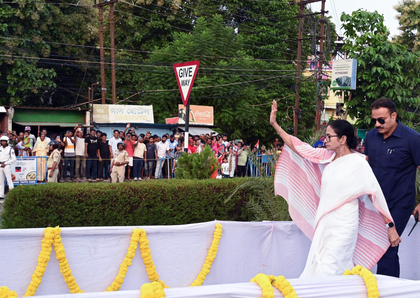Will Mamata’s booth-level APAS scheme deliver governance or votes?
By IANS | Updated: September 10, 2025 16:10 IST2025-09-10T16:05:32+5:302025-09-10T16:10:10+5:30
Kolkata, Sep 10 West Bengal Chief Minister Mamata Banerjee’s introduction of a new welfare scheme is fast turning ...

Will Mamata’s booth-level APAS scheme deliver governance or votes?
Kolkata, Sep 10 West Bengal Chief Minister Mamata Banerjee’s introduction of a new welfare scheme is fast turning out to be an immensely popular outreach months before the Assembly elections to be held next year.
The public response to “Amader Para, Amader Samadhan” (Our Neighbourhood, Our Solution) -- APAS in short -- has been overwhelming, with citizens flocking to camps in huge numbers.
The programme places a booth-level focus on resolving everyday local issues -- ranging from broken water taps and electric poles to playground and street repair -- by organising weekly camps in every polling-booth area across rural Bengal.
With a total outlay of around Rs 8,000 crore, each booth receives Rs 10 lakh -- to be allocated through real-time public deliberation at three-booth Janata Darbar camps. Government officials are accompanied by local representatives at camps to hear grievances and sanction projects with a pledge to begin work within 90 days.
APAS camps, which began on August 2, will go on till November 3.
Over one crore people visited about 14,500 camps within the month of its launch, say reports.
Not that the Opposition wasn’t aware of the political mileage Mamata’s flagship outreach initiative could garner.
Asserting that the scheme uses public funds as pre-election inducements rather than sustainable welfare measures, BJP West Bengal unit’s former president Dilip Ghosh has termed APAS “nothing but a carefully timed vote-bank ploy”.
The Opposition points out that the presence of local elected representatives with officials at such camps clearly proves TMC’s intent. They argue that similar outreach has not yet been held at the few panchayats or municipalities where the Opposition is strong.
Neither will that ever be held, they claim.
However, according to senior journalist Biswajit Bhattacharjee, who was present at one such camp held at Kolkata Corporation Ward No. 5, no local elected representative, like a councillor, was present.
“There were local authorities, and Kolkata Corporation staff, one of whom attended to public grievances, another fed the data on a computer,” recalled Bhattacharjee.
“Most complaints were over waterlogging, street lights, parked cars blocking streets, among others,” he added.
He feels that usually such complainants refrain from going to the councillor, fearing a reprimand. “Because, in a way, the complaint is about an elected representative’s ineptitude,” he added.
However, he pointed out, the exercise is allowing the administration to build a database that can provide inputs at the poll-planning stage.
A senior leader of the Communist Party of India (Marxist), Surjya Kanta Mishra, labeled the scheme “TMC’s booth revival strategy,” arguing that channeling Rs 10 lakh per booth is unsustainable and undermines genuine decentralised planning.
The Opposition has also claimed that the state government is trying to “divert attention” from allegations of corruption, nepotism, and breakdown in law-and-order situation in the state.
Meanwhile, APAS augments earlier programmes like “Duare Sarkar” (government at doorstep) -- where people can avail facilities at home. Add to this dole handouts to senior citizens, women, the girlchild, etc., and so on.
And, of course, with Bengal preparing for its biggest festival of Durga Puja later this month, the honorarium per club -- or organiser -- has been raised to Rs 1.1 lakh. This is almost a 30 per cent increase from the Rs 85,000 given last year.
Considering around 45,000 such “clubs” in the state, the pressure on its exchequer can well be imagined.
But then, the line between welfare schemes and freebies has already been blurred in the country.
Disclaimer: This post has been auto-published from an agency feed without any modifications to the text and has not been reviewed by an editor
Open in app